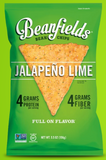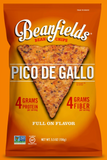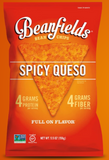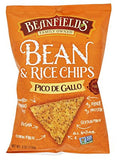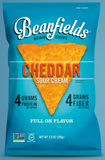 We started Jackson's Honest Chips based on our passion for providing healthy, great tasting potato chips for our four children. For years we were alternately flabbergasted and bemused by the breadth of snack foods that were fried in some combination of highly processed and denatured polyunsaturated vegetable oils. So we started making potato chips in our own kitchen using the healthiest frying oil we could find: coconut oil. Lo and behold, they tasted great, our kids loved them, and my husband and I knew that coconut oil was a far healthier fat to fry in than vegetable oils.
We started Jackson's Honest Chips based on our passion for providing healthy, great tasting potato chips for our four children. For years we were alternately flabbergasted and bemused by the breadth of snack foods that were fried in some combination of highly processed and denatured polyunsaturated vegetable oils. So we started making potato chips in our own kitchen using the healthiest frying oil we could find: coconut oil. Lo and behold, they tasted great, our kids loved them, and my husband and I knew that coconut oil was a far healthier fat to fry in than vegetable oils.
The potato chip industry abandoned highly saturated tropical oils in favor of polyunsaturated vegetable oils many decades ago.
But we admit to starting Jackson's Honest Chips out of a good bit of idealism too. You see, the potato chip industry is a behemoth: almost $10 billion worth of potato chips are sold in the US annually. Since its invention in 1853, the potato chip has become a staple of the American diet, and it has ranked as the country’s number-one snack food for more than 50 years. Potato chips are eaten in 85 percent of U.S. households every three weeks. As you might imagine, multinational conglomerates account for the vast majority of those sales. The large manufacturers who have monopoly-like control of the supply and distribution chain in the potato chip industry seemed to us to be largely ignoring the demands from an increasingly educated and demanding consumer for healthier choices of snacks. The heavy use of pesticides, the genetically-modified potatoes, the factory farms, and the highly processed and denatured vegetable oils they use are the inputs into a computer-controlled manufacturing process in which potatoes never touch a human hand.
 As concerned parents who follow a combination of Paleo, Weston Price, organic, local, and seasonal diets, we focus on the types of fats our children consume. Our visits to various health foods stores and natural grocers across the country always ended in the frustration that we couldn’t find a potato chip fried in a healthy oil like coconut oil. Sure there were organic varieties; there were rippled, kettle, and root vegetable derivatives; there were dozens of different flavors too. And while the last decade or so has brought tremendous changes in potato chip flavors, brands, and varieties, the reality is that nearly every single manufacturer uses the same highly processed vegetable oils or vegetable oil blends to fry their potato chips: canola oil, sunflower oil, safflower oil, corn oil, soy oil, or cottonseed oil.
As concerned parents who follow a combination of Paleo, Weston Price, organic, local, and seasonal diets, we focus on the types of fats our children consume. Our visits to various health foods stores and natural grocers across the country always ended in the frustration that we couldn’t find a potato chip fried in a healthy oil like coconut oil. Sure there were organic varieties; there were rippled, kettle, and root vegetable derivatives; there were dozens of different flavors too. And while the last decade or so has brought tremendous changes in potato chip flavors, brands, and varieties, the reality is that nearly every single manufacturer uses the same highly processed vegetable oils or vegetable oil blends to fry their potato chips: canola oil, sunflower oil, safflower oil, corn oil, soy oil, or cottonseed oil.
The potato chip industry abandoned highly saturated tropical oils in favor of polyunsaturated vegetable oils many decades ago. The reasons behind this are varied and complex. Economics, political influence, faulty nutritional science: all played an important role. But years of new evidence based on balanced nutritional science are implicating polyunsaturated vegetable oils as health antagonists when they are heated, pressed under high pressure, and oxidized by the modern vegetable oil manufacturing process. The most infamous polyunsaturated oil – ‘trans’ fats – being one derivative of the vegetable oil manufacturing process.
As you might imagine, lipid chemistry – the study of fats – is a highly complex science. But researchers and authors like Dr. Mary Enig, Gary Taubes, Dr. Bruce Fife and nearly the entire Paleo and Weston A. Price communities have come to the conclusion that healthy, traditional fats like lard, tallow, palm kernel oil and coconut oil are not at all the demons they are made out to be, that they constitute an important and, in certain respects, essential component of a healthy diet. And, further, that the overconsumption of polyunsaturated vegetable oils – particularly ‘omega 6’ oils – constitute a misunderstood health risk.
 ‘Eating is an agricultural act’; these are the words of Wendell Berry. The tag line on our bag reads: ‘From the field, the farmer, and the fryer…to you.’ And when we decided to see if we could sell coconut oil potato chips, we wanted to make sure that – at every step of the production process – we were doing what was right for the consumer, for the farmers, for the environment, for our suppliers, and our employees. So we source potatoes from small-scale family farmers that we know and trust who use organic or biodynamic methods on their farms and never use GMO varieties. We purchase the highest grade organic coconut oil from companies that treat the soil and their workers fairly and use traditional coconut oil extraction techniques. We use sea salt so consumers can benefit from its many trace minerals. Finally, we had our bags designed and produced right here in the U.S.
‘Eating is an agricultural act’; these are the words of Wendell Berry. The tag line on our bag reads: ‘From the field, the farmer, and the fryer…to you.’ And when we decided to see if we could sell coconut oil potato chips, we wanted to make sure that – at every step of the production process – we were doing what was right for the consumer, for the farmers, for the environment, for our suppliers, and our employees. So we source potatoes from small-scale family farmers that we know and trust who use organic or biodynamic methods on their farms and never use GMO varieties. We purchase the highest grade organic coconut oil from companies that treat the soil and their workers fairly and use traditional coconut oil extraction techniques. We use sea salt so consumers can benefit from its many trace minerals. Finally, we had our bags designed and produced right here in the U.S.
All of the above is a roundabout way of describing an ethos more than a company. We aren’t out to dominate the potato chip business – we will leave that to large multinational corporations that dominate the industry. Our goal is to make a great tasting potato chip in a healthy oil that respects the intelligence of our consumer and the efforts of our family farm suppliers. Enjoy.


